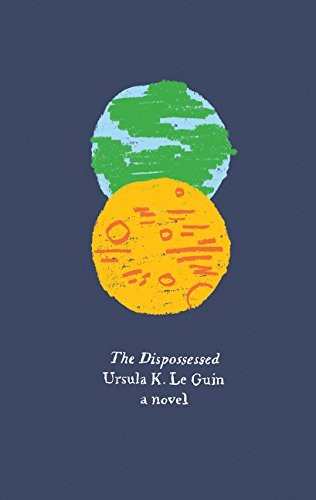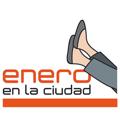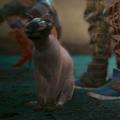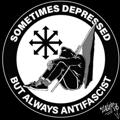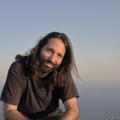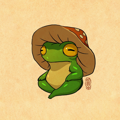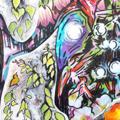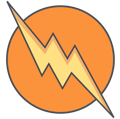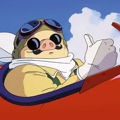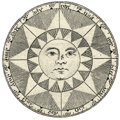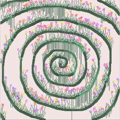( sol2070.in/2025/07/os-despossuidos-ursula-le-guin/ )
Reli recentemente Os Despossuídos (1974, 384 pgs), de Ursula K. Le Guin. Fiquei impressionado sobre como foi superficial e acelerada minha primeira leitura, há três anos. Não só tinha esquecido como é excelente, mas muitas coisas nem percebi ou vi só de relance.
O romance costuma ser chamado de “a melhor ficção anarquista[^1] já escrita”. Além disso, inclui especulações instigantes sobre a natureza do universo — na ideia de que o espaço (e, consequentemente, o tempo) é uma limitação específica da mente e percepção humanas, e não uma realidade física — e o problema ético sobre os fins justificarem os meios.
Como sempre, a humanidade das personagens é muito tocante — marca característica da consagrada escritora, asssim como o pano de fundo sociopolítico-ambiental.
Conta a estória de Shevek, um físico à beira de revelar uma teoria revolucionária. Ele é nativo do planeta Anarres, quase desértico, onde as pessoas vivem sem hierarquias e autoridades, compartilhando tudo, mas entre dificuldades ambientais e de abastecimento. Anarres fica próximo do planeta Urras, um sendo a lua do outro. São espelhos invertidos. Urras é como a Terra hoje, há natureza relativamente abundante (em comparação com Anarres), além de riqueza extrema, mas totalmente concentrada numa oligarquia, enquanto a maioria absoluta suporta dificuldades.
Shevek tem contato com os físicos de Urras e sente que seu trabalho poderia ser melhor apreciado no planeta hierarquista. Então, fura a barreira ideológica e física entre os dois mundos e vai a Urras. Há interesses ocultos dos dois lados nessa visita, envolvendo ciência sem precedentes e insurreição.
A descoberta tem a ver com uma tecnologia-chave do universo hainiano de Os Despossuídos e outros sete romances, além de 13 contos: o ansível (ansible[^2]), que permite a comunicação instantânea entre vastidões de anos-luz.
A tecnologia se baseia na nova teoria física, em que objetos no espaço são simultâneos e não sequenciais ou lineares, a distância entre eles sendo subjetiva e não objetiva.
Em um entrelaçamento brilhante, essa especulação sobre a natureza da realidade se conecta com a utopia sociopolítica de Anarres.
Ainda criança, Shevek desafia seu professor com uma explicação matemática de um fenômeno corriqueiro. Uma pedra atirada em uma árvore, quando chega na metade do trajeto, ainda tem metade do trajeto restante para atravessar, e depois metade, e mais metade, sucessiva e infinitamente. A conclusão absurda é que a pedra nunca atingiria a árvore, segundo essa fórmula que, conceitualmente, não tem nada de errado.[^3]
O que fica implícito aí é que a matemática e a física lineares não capturam a realidade do modo como é. Isso, entre outros fatores, incita Shevek a buscar uma teoria mais coerente com a realidade.
Em algumas cenas, o livro se conecta à consagrada parábola de Le Guin Aqueles que se Afastam de Ômelas[^4]. A estória é sobre uma cidade de felicidade plena, em que as pessoas precisam autorizar que uma criança presa sofra muito para a manutenção dessa felicidade. Elas consentem justificando-se com a lógica de que valeria a pena apenas uma criança sofrer imensamente, se esse for o preço para a felicidade de milhares de pessoas.
Em uma cena de Os Despossuídos, entre outras, essa lógica também é questionada. Um motorista de trem carregando alimentos precisa escolher entre atropelar e matar algumas pessoas famintas querendo saqueá-lo, ou parar o trem e deixar saquearem, sacrificando o número muito maior de pessoas que está esperando o alimento.
Em Ômelas, algumas poucas pessoas não consentem com a tortura da criança, em nome de um bem maior. Não aceitam essa lógica. Obrigatoriamente, elas têm que sair da cidade, sacrificando o próprio bem-estar. Partem para um destino incerto, cheio de privações.
Nesse conto, não há menção ao anarquismo. Mas no conto O Dia Antes da Revolução, um tipo de prequela de Os Despossuídos, a conexão fica clara. No preâmbulo, Ursula se refere à revolucionária anarquista Odo (de Os Despossuídos) assim:
Essa estória é sobre uma daquelas que se afastou de Ômelas.
A autora tem uma definição ampla sobre o que define uma pessoa anarquista[^5]. Para ela, há algo essencial que antecede até mesmo noções sobre hierarquia e autoridade. Anarquista é “alguém que, ao escolher, aceita a responsabilidade da escolha”.
Como aquelas que se afastam de Ômelas, já que reconhecem que são elas que estão causando a tortura da criança e decidem não participar disso. Assim, aceitam o sofrimento pessoal consequente dessa escolha.
A austeridade material da vida em Anarres é um desses sacrifícios. Assim como a escuridão para onde caminham aquelas que se afastam de Ômelas.
O modo como elas enxergam o impasse sobre torturar ou não uma criança para que um número maior de pessoas tenham conforto é o seguinte: o sofrimento ou felicidade de alguém não é algo que uma equação matemática captura, não há sentido em sacrificar uma pessoa pela felicidade de mil outras.
Isso é similar à imagem de Shevek em que a pedra jamais atinge a árvore, porque tal equação matemática não captura o que acontece na realidade. Esse tipo de pensamento é um instrumento débil e insuficiente.
Shevek descobre a teoria que se aproxima mais da realidade absoluta, independente de percepções individuais subjetivas. E, de certo modo, isso é um reflexo da sociedade anarquista de Anarres, em que não pessoas não são reduzidas a números. Cada uma é valiosa pelo que é, e isso só enriquece e possibilita a expressão do todo.
O título “Os Despossuídos” é uma referência ao romance de Dostoiévski Os Possessos (de 1871, também traduzido como “Os Possuídos”, ou “Os Demônios”), em que ideologias políticas desumanizam as pessoas e chegam a validar violências diversas como um meio para fins supostamente nobres. Le Guin escreveu sua estória como um espelho invertido disso.
Reli o livro no clube de leitura Contracapa. Nas conversas, uma das perguntas que fizemos foi: “Você escolheria viver em Urras ou Anarres?” Não é uma escolha simples, porque Ursula, de modo brilhante, retrata Anarres como um lugar muito inóspito. Já Urras é como aqui, apesar das dificuldades, desigualdades e injustiças, não é um deserto (ainda) e há condições materiais relativamente abundantes.
Shevek se deslumbra com a natureza de Urras e sua riqueza, inicialmente. Ele se sentia mal em Anarres por estar alienado das outras pessoas, que não o compreendiam. Sai de Anarres também como um tipo de protesto. Entretanto, aos poucos vai conhecendo os horrores de Urras, que escondiam dele. Então, passa a dar valor a Anarres, percebendo mais nitidamente o que não conseguia ver.
As dificuldades de Anarres são todas circunstanciais: algumas pessoas difíceis, burocracias cristalizadas por aflições humanas, desastres ambientais, injustiças acidentais etc. Mas nada que não possa ser corrigido pela auto-organização das próprias pessoas. Ele e sua mulher inclusive sonham em criar uma comunidade mais genuinamente odoniana e livre, anarquista. Lá, isso é plenamente possível, nada impede.
Já em Urras, os problemas são sistêmicos. Para mudar algo radicalmente, só destruindo o sistema vigente. E qualquer movimento nessa direção é brutalmente reprimido e até aniquilado. Em uma cena que resume tudo, um ativista tem sua mão destroçada por balas porque ousou estendê-la a outras pessoas.
O fato de Anarres ser um local inóspito realça ainda mais a solidez e força de sua cultura. Por mais difícil que seja a situação, incluindo fome e escassez, nenhum colapso social jamais ocorre, devido aos valores essenciais da ajuda mútua e da associação voluntária (sem autoridades forçando nada).
É meu livro preferido de Ursula K. Le Guin, não apenas por essas discussões políticas, éticas e até pela espiritualidade cósmica laica. Nas relações humanas, também brilha como poucos.
Adoro o final. No retorno triunfal, com forte sugestão de que os valores odonianos não mais ficarão contidos num único planeta, Shevek também está radiante:
Era um homem liberto da prisão, indo para casa, para a família. Seja o que for que uma pessoa assim veja ao longo do caminho, ela vê apenas como reflexos da luz.
